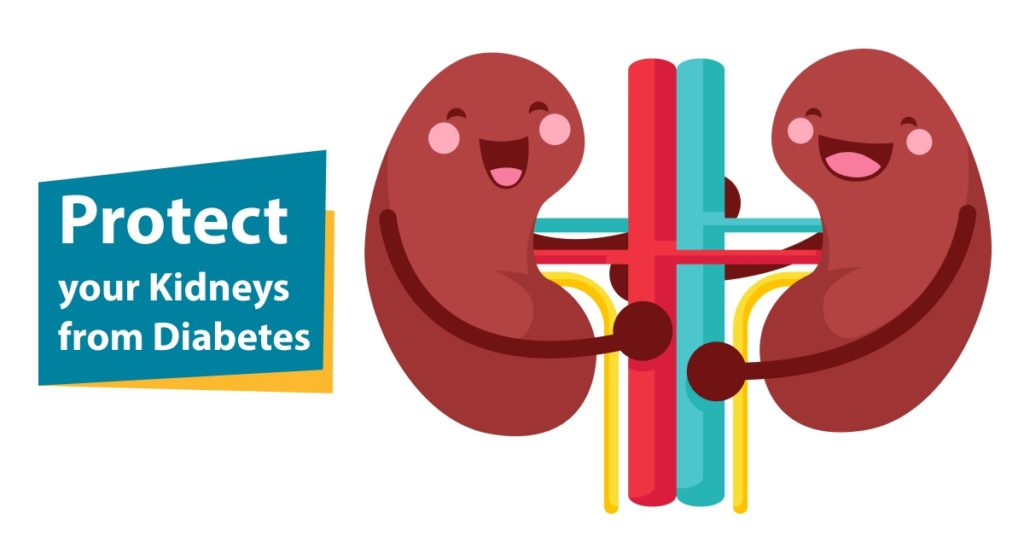Protect Your Kidney From Diabetes

Understanding the Threat: Diabetic Kidney Disease
Diabetic kidney disease (DKD) is a serious complication of diabetes that can have severe consequences if left unchecked. It is essential to understand the risks and take proactive measures to shield your kidneys from damage.
What is Diabetic Kidney Disease?
DKD is a type of kidney disease that occurs when diabetes damages the blood vessels and nerves in the kidneys, leading to impaired kidney function. This damage can cause waste and toxins to build up in the blood, further exacerbating the condition.
The Risks of Diabetic Kidney Disease
DKD can lead to kidney failure, requiring dialysis or transplantation. This is a life-altering consequence that can significantly impact daily life and overall well-being. Furthermore, DKD can also increase the risk of heart disease, stroke, and other cardiovascular conditions.
The Importance of Early Detection and Prevention
Early detection and prevention are crucial to mitigating the risk of DKD. By managing blood sugar levels, blood pressure, and cholesterol, individuals with diabetes can significantly reduce their risk of developing DKD. Regular kidney function tests and urine albumin tests can help identify early signs of kidney damage, allowing for prompt intervention and treatment.
Risk Factors: Knowing Your Vulnerabilities
As a diabetic, it's crucial to understand the risk factors that can contribute to kidney disease. By being aware of these factors, you can take proactive steps to shield your kidneys and reduce the likelihood of complications. Here are some key risk factors to consider:
High Blood Sugar Levels
Prolonged high blood sugar levels can damage the delicate blood vessels in your kidneys, leading to chronic kidney disease. Maintaining good blood sugar control through diet, exercise, and medication (if prescribed) is essential to mitigate this risk.
High Blood Pressure
Uncontrolled high blood pressure can put extra strain on your kidneys, increasing the risk of damage. Working with your healthcare provider to manage your blood pressure through lifestyle changes and medication (if necessary) is vital.
Family History of Kidney Disease
If you have a family history of kidney disease, you're more likely to develop the condition. Be aware of your genetic predisposition and take extra precautions to protect your kidneys.
Obesity and Physical Inactivity
Carrying excess weight and leading a sedentary lifestyle can increase your risk of developing kidney disease. Maintaining a healthy weight through a balanced diet and regular physical activity can help reduce this risk.
Lifestyle Interventions: Empowering Prevention
Adopting a healthy lifestyle is crucial for shielding your kidneys from the damaging effects of diabetes. By making informed choices, you can significantly reduce the risk of kidney disease and promote overall well-being.
Maintain Healthy Blood Sugar Levels through Diet and Exercise
Managing blood sugar levels is essential for diabetics. A balanced diet that is rich in whole foods, fruits, and vegetables, along with regular physical activity, can help regulate blood sugar levels. Aim for at least 150 minutes of moderate-intensity aerobic exercise, or 75 minutes of vigorous-intensity aerobic exercise, or a combination of both, per week.
Monitor and Manage Blood Pressure
High blood pressure can further strain your kidneys. Regularly monitor your blood pressure and work with your healthcare provider to manage it through lifestyle changes or medication. Aim for a blood pressure target of less than 130/80 mmHg.
Stay Hydrated and Limit Protein Intake
Adequate hydration helps your kidneys function properly. Drink plenty of water throughout the day, aiming for at least 8-10 glasses. Additionally, limit your protein intake to reduce the strain on your kidneys. Aim for 0.8-1 gram of protein per kilogram of body weight per day.
Quit Smoking and Limit Alcohol Consumption
Smoking and excessive alcohol consumption can damage your kidneys and worsen diabetes. Quit smoking and limit alcohol intake to no more than one drink per day for women and two drinks per day for men.
Medical Management: Collaborating with Your Healthcare Team
As a diabetic, shielding your kidneys requires a multi-faceted approach that involves close collaboration with your healthcare team. By working together, you can develop a personalized plan to manage your condition and prevent kidney damage.
Regular Kidney Function Tests and Urine Albumin Screenings
Regular kidney function tests and urine albumin screenings are crucial in monitoring your kidney health. These tests help identify any potential issues early on, allowing for prompt intervention and treatment. Your healthcare team will typically recommend:
- Estimated Glomerular Filtration Rate (eGFR) tests to measure kidney function
- Urine albumin-to-creatinine ratio (ACR) tests to detect albumin in the urine, a sign of kidney damage
Medications to Manage Blood Sugar, Blood Pressure, and Cholesterol
Managing blood sugar, blood pressure, and cholesterol levels is critical in preventing kidney damage. Your healthcare team may prescribe medications to:
- Regulate blood sugar levels, such as metformin or insulin
- Control blood pressure, such as ACE inhibitors or angiotensin receptor blockers
- Lower cholesterol levels, such as statins
Work with Your Healthcare Team to Set Personalized Goals and Targets
Collaborate with your healthcare team to set specific, achievable goals and targets for managing your diabetes and kidney health. This may include:
- Target blood sugar levels
- Target blood pressure levels
- Target cholesterol levels
- Lifestyle modifications, such as diet and exercise plans
Staying Vigilant: Early Detection and Treatment For diabetics, safeguarding kidney health is paramount. Early detection and timely treatment are crucial in slowing down kidney disease progression. Being proactive about your health can significantly improve outcomes. Recognizing the Red Flags Diabetic kidney disease often progresses silently, but there are vital signs to watch out for: Swelling: Noticing swelling in your legs, ankles, or feet? It could be a sign that your kidneys are struggling to filter waste and excess fluids. Fatigue: Feeling persistently tired or weak? It may indicate a buildup of toxins in your blood due to impaired kidney function. Nausea and Vomiting: Experiencing frequent nausea or vomiting? It could signal electrolyte imbalances or waste accumulation. Prompt Medical Attention is Key If you notice any unusual changes or experience symptoms persistently, seek medical attention immediately. Your healthcare provider will assess your condition and provide personalized guidance. The Power of Early Detection Early detection and treatment significantly slow the progression of kidney disease. Regular check-ups and monitoring enable: Timely Interventions: Addressing issues before they escalate into serious complications. Slowing Disease Progression: Effective management strategies can reduce kidney damage. Improved Quality of Life: Proactive care helps maintain overall well-being. By staying vigilant and proactive, diabetics can safeguard their kidney health and reduce the risk of complications. Remember, early detection and timely treatment are powerful tools in shielding your kidneys.
Shielding Your Kidneys: A Proactive Approach
Understanding Your Risks
As a diabetic individual, it's essential to acknowledge the heightened risk of developing Diabetic Kidney Disease (DKD). DKD is a leading cause of kidney failure, and understanding your risks is the first step towards proactive protection. Factors that increase your likelihood of developing DKD include:
- Uncontrolled blood sugar levels
- High blood pressure
- Family history of kidney disease
- Obesity
- Smoking
Proactive Strategies for Protection
By understanding your risks and taking proactive steps, you can reduce your likelihood of developing DKD. Here are some strategies to help you shield your kidneys:
- Monitor and manage your blood sugar levels
- Keep your blood pressure under control
- Stay hydrated by drinking plenty of water
- Exercise regularly to maintain a healthy weight
- Quit smoking to reduce kidney damage
- Get regular kidney function tests
Stay Informed, Empowered, and Committed
Staying informed about your kidney health is crucial in the fight against DKD. Educate yourself on the latest research, treatment options, and management strategies. Empower yourself by taking ownership of your health, and commit to making lifestyle changes that promote kidney well-being. By doing so, you'll be well on your way to shielding your kidneys and reducing the risk of DKD.

















Comments ()